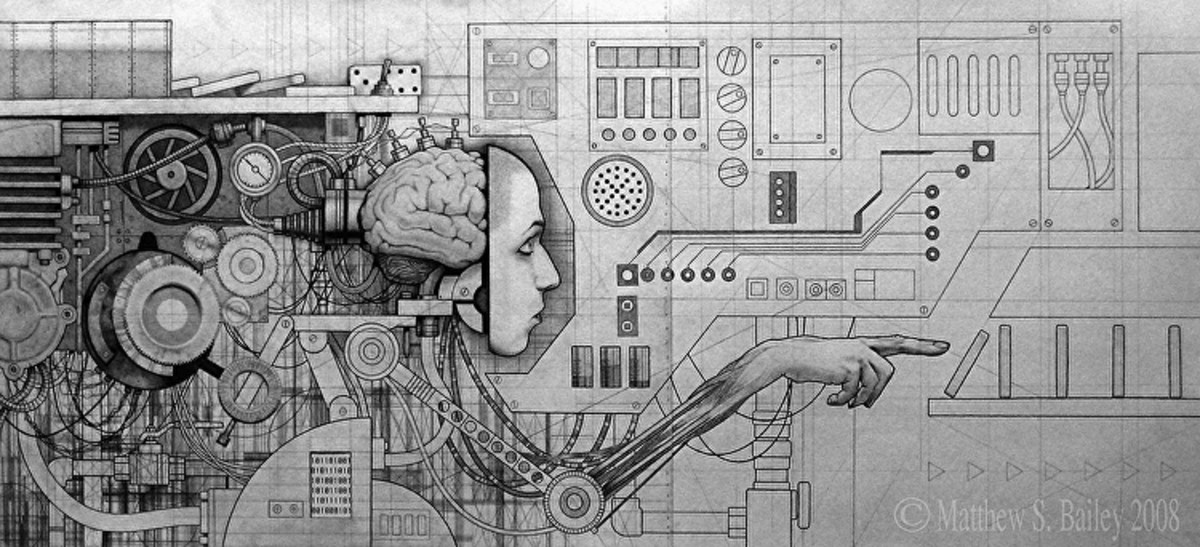What is Abstract Thinking?

Our age is the age of the rational. Many consider this a wonderful success, for with the great empire of science we have invented technologies and discovered knowledge that our ancestors would have barely been able to comprehend. Yet when you look at the world, there are still the same fundamental problems that seem to never get fixed.
People still die, love still hurts and the poor go hungry. I may be bitter, but it seems that all our advances have merely made life more comfortable, not better. I still feel most alive when I am looking at a cloudless night sky full of radiant stars, but here in Dublin light pollution is making the stars less and less visible, they have become the cameo's of my life.

What am I to do? I feel like I'm being negative when I tell people "this technology isn't all it's cracked up to be." surely the technology is not to blame, it must be our ways of using it, and I have pursued this line of thought.
I entertained this idea: The world is changing for the better, but people are remaining the same. In fact, because we have so many resources and we don't utilize them to their maximum potential: maybe people are getting worse.
Still pointing fingers and not offering solutions aren't I?
Well how about this: Technology is disconnected from the real world, to prove my point show me where the internet is in reality. Technology is an abstract idea that we have plucked out of our imaginations and brought into reality, but we have not yet connected the two. I have sat in a room full of people "chatting" only to notice that everyone was on their phones, and the only human conversations we about incidents that happened on social networks.
Maybe I'm just no fun.
The great overarching theme of our modern lives is that nothing has any meaning unless it is new and cutting edge. It is not cool to believe in things, to disagree with the value of newly discovered facts or to criticise logical thinking.

But is there such a thing as being too rational? Is there any worth in being so logical, technological and abstract that you escape the real world? All the real things in life happen to you. They don't happen to your facebook avatar or your iPhone, they involve touch, smell and emotions. Things like sex, death, responsibility, violence and hope are all human experiences that are impossible to make sense of using abstract logic. When I escape real life onto the internet, it doesn't make anything better, it is simply a form of sedation, like any alcoholic will use to cure their broken souls.
But these technologies aren't negative, what is negative is the overly abstract thinking that comes along with them. We learn all the facts about India, but never actually buy the plane ticket to go there. We live in a world inside our heads, like a shared technological dream, and we consider the real world the sleeping.
How can we change this strange scenario?
My answer is symbols.

My approach is that logic is a method of connecting symbols. For example in its purest form (mathematics) we use logic to connect numerical symbols (10 - 6 = 4) The symbols are the number and they can be related to the real world (eg. 10 eggs). Logic on the other hand is abstract (subtraction is not a real world item that you can pick up and play with, unlike an egg.)
So my point would be that anyone who claims to think entirely 'logically' is actually blind to the fact that they need symbols in the first place in order to use reason on them. They are actually thinking symbolically, just refusing to accept it, creating a shadow.
This shadow manifests as them taking abstract concepts and turning them into "real world" items. They replace their symbols with intangible ideas. A good example of this would be the creation of a 'nation', a nation isn't real, the world has no frontiers, yet we fully believe they are there.
This is called nominalization.
Nomilizations are the ultimate sin of language and they are insanely predominant in modern society. Technology is itself becoming a nominalization, where we are treating dead material objects as the only means in which we can live.
I am calling for a return to symbols! Lets start talking about things that are relevant, things in life that effect us, like pain and pleasure. Technology has the profound ability to connect us all into one unit, but all of this will be lost in our interconnection yields no real fruit in the real world.
Have we as a culture the courage to change the world with our technology as opposed to comment on it.










